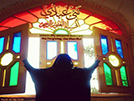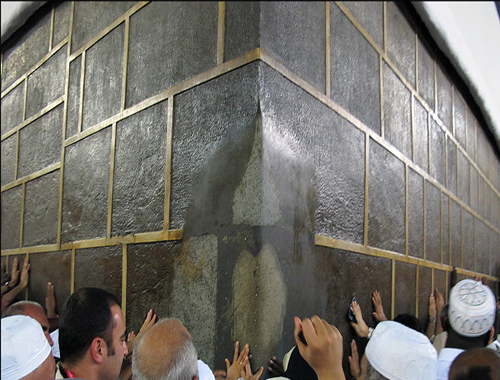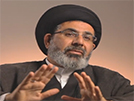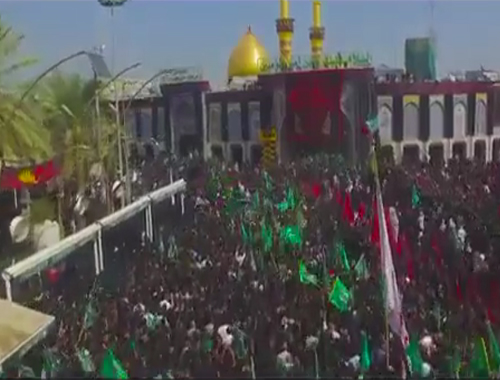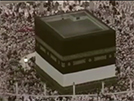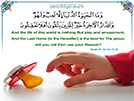Miscellaneous Issues (Q/A)
- Details
- Hits: 3502
Miscellaneous Issues (Q/A)
A. Usually it would not be known in this way that all sites of the masjid would be najis and investigation is not obligatory. So prostration on the ground is correct.
Q2: Is congregational prayer in a circular manner around Ka’bah valid?
A. The prayer of those who stand behind imam or on his sides is correct. It is based on mustahÌ£abb caution for those who stand on both sides to observe the distance between imam and Ka’bah and do not stand nearer to Ka’bah. While prayer of those who stand in front of imam on the opposite side of Ka’bah is incorrect.
Q3: Is it valid to join a congregational prayer behind a Sunni imam in Mecca al-mukarramah or Medina al-munawwarah?
A. God willing, it is valid.
Q4: One who intends to reside for 10 days in Mecca, what is the rule about his prayer in ‘ArafÄt, Mash’ar, MinÄ and in between?
A. If before setting off for ‘Arafat, he intends to stay for the whole 10 days in Mecca and accordingly says at least one full four rak’ah prayer, he would continue in praying as such and his leaving Mecca to ‘ArafÄt, Mash’ar and MinÄ, after the rule of staying is settled, would not be considered as a traveling unless another travel would interfere.
Q5: Is the rule of choice between praying qasÌ£r and full prayer applicable in Mecca and Medina or it is specific for Masjid al-HÌ£arÄm and Masjid al-NabÄ«? And is there a difference between their old and new places or not?
A. The ruling of choice between qaṣr and full prayer is applicable everywhere in these two cities and apparently, there is no difference between their old and new districts. However, regarding this issue, it goes with mustaḥabb caution, to apply it only to the old districts or even only to the two honorable masjids. So one prays qaṣr unless one intends to stay there for 10 days.
Q6: What is the rule about the validity of ḥajj of those who refuse to participate in the gathering of repudiating the polytheists (al-barĒah min al-mushrikīn)?
A. It will not harm the correctness of one’s hÌ£ajj. However, one would miss the virtue of participation in the gathering of declaring repudiation of the enemies of Allah, the Sublime.
Q7: Are women, during menstrual period or ‘puerperium’, allowed to sit on the wall separating the porch of the Masjid al-HÌ£arÄm and the corridor of sa’y?
A. There is no problem in it unless it is proved that it is a part of masjid al-HÌ£arÄm.
Q8: What is the rule about the validity of hÌ£ajj of a person who doubts about attending the two wuqÅ«fs and the day of ‘Ä«d due to the contradiction in the sight of the crescent moon? Is he / she obliged to repeat his hÌ£ajj or not?
A. It is valid for him / her to act according to the verdict issued by the Sunni ruler about the sighting of the new moon of Dhū al-ḥijjah. Thus if he attended the two wuqūfs with the people, his ḥajj is valid.
Q9: It has been read in some of your answers that you do not permit the performance of congregational prayer inside the hotels of Mecca. Is it permissible to perform it in the houses where the caravans of hÌ£ajj live during hÌ£ajj? Knowing that these houses are specifically occupied by the caravans and performing congregational prayer in them would not be considered as an excuse to neglect praying inside Masjid al-HÌ£arÄm?
A. It is not permissible to perform congregational prayer inside the houses either if it attracts others' attention and pilgrims are criticized for not taking part in public congregational prayers performed by Muslims in the masjid.
Q10: The drivers use some of the newly built roads and tunnels which lead to MinÄ and Muzdalifah as internal roads to escape traffic jam, i.e. to go from one quarter to another, they use roads that pass through MinÄ. Is that considered as going out of Mecca or not?
A. Apparently, these are not examples of getting out of Mecca. However, it would not harm the correctness of ‘umrah and hÌ£ajj.
Q11: If caravan’s servants, who accompany women and weak persons the night before ‘Ä«d and leave Mash’ar al-HÌ£arÄm before the dawn, are able to return and attend the normal wuqÅ«f before the dawn, are they obliged to do that or not? Is ramy at night with the women and weak persons valid for them or they are obliged to if possible? And suppose they can return and attend the normal wuqÅ«f, is that enough to hire them for performing hÌ£ajj on others’ behalf or that hiring them is not permissible because by leaving Mash’ar at night they would be included in the excused group who could not be hired?
A. 1) If they leave Mash‘ar with women and the weak after the strict meaning of wuqÅ«f is realized, they are not obliged to return and attend the normal wuqÅ«f.
2) It is not sufficient for them to do ramy at night unless they are excused from doing ramy during the day.
3) Regarding a pilgrim on behalf, it is based on obligatory caution that he / she should not leave Mash‘ar al-HÌ£arÄm at night even if he / she can return and attend the normal wuqÅ«f at Mash‘ar. However, if we suppose that he / she is not excused and his / her leaving is not against his / her will, there is no problem in hiring him / her if he / she would return and attend the normal, and entire obligatory part of wuqÅ«f.
Q12: Some people accompany women and the sick the night before ‘Ä«d and take them to Mecca al-mukarramah after the strict meaning of staying at Muzadlifah is relized. Are they obliged to return to Muzdalifah before fajr or they may suffice with wuqÅ«f from fajr till sunrise or even with the realization of the strict meaning of staying, keeping in mind the difficulty resulting from the traffic measures that authorities apply there? And is there a difference — in this regard —between pilgrims on others’ behalf and others?
A. It is not obligatory for those who leave with excused persons to look after them to do wuqūf from fajr till sunrise and the compulsory night wuqūf will suffice for them. However, this act is not permissible for those performing ḥajj on behalf of others who are obliged to perform the normal practices.
Q13: Is it permissible, under normal conditions, to do ihÌ£rÄm by nadhr before reaching the mÄ«qÄt if one is certain that they will be compelled to shade themselves because of this act e.g. doing ihÌ£rÄm by nadhr in one’s country and traveling with aeroplane during the day?
A. Entering ihÌ£rÄm by nadhr before the mÄ«qÄt is correct, while shading during day is hÌ£arÄm and the rule of one act would not apply to another one.
Q14: A man works in the army and sometimes he is ordered to go to Mecca al-mukarramah immediately in an emergency, knowing that he has not performed ‘umrah and could not enter Mecca with ihÌ£rÄm due to shortage of time. Would he commit a sin by such an act? Or is kaffÄrah obligatory?
A. In the given question, he could enter Mecca al-mukarramah without ihÌ£rÄm and nothing would be upon him.
Q15: If one enters Mecca on the month of DhÅ« al-Qi‘dah to perform ‘umrah al-mufradah and he wants to enter Mecca again in the month of DhÅ« al-hÌ£ijjah before 10 days from the previous ‘umrah, is he obliged to put on ihÌ£rÄm again or he could enter Mecca without it?
A. As he enters Mecca in the next month, he is obliged to put on ihÌ£rÄm according to obligatory caution.
Q16: Somebody lives in Jaddah and works in Mecca i.e. he goes to Mecca every day except on holidays or goes there 3 days a week. Is he obliged to renew his ‘umrah when the hijrÄ« month ends?
A. In the given case, he is not obliged to renew the ‘umrah.
Q17: If ‘umrah ends while one is still in Mecca, is he obliged to renew it? From where? Is it obligatory for it to be from the boundaries of the HÌ£arÄm or from the Masjid al-Tan‘Ä«m?
A. As long as he is in Mecca, he is not obliged to renew it. But if he wants to renew it, he should leave to the nearest point outside the boundaries of the HÌ£arÄm or to Masjid al-Tan’Ä«m.
Q18: A person who is a taxi driver and who had not performed ‘umrah previously, is he obliged to enter Mecca with ihÌ£rÄm if a customer hired his car to go to Mecca? And what is the rule if he enters it without ihÌ£rÄm?
A. In the given question, he is obliged to enter Mecca with ihÌ£rÄm and perform ‘umrah al-mufradah. If he enters Mecca without ihÌ£rÄm, he would be committing a hÌ£arÄm act but there is no kaffÄrah upon him.
Q19: One who does a mustahÌ£abb tÌ£awÄf when it is highly crowded so that he would bother those pilgrims who are doing the obligatory tÌ£awÄf, is there any problem with his act especially if he has the time to do mustahÌ£abb tÌ£awÄf later?
A. There is no problem with him. However, it is better, and even goes with caution, to abstain from doing mustahÌ£abb tÌ£awÄf when it is crowded.
Q20: One who is performing obligatory or mustahÌ£abb hÌ£ajj al-ifrÄd while he had already performed ‘umrah, several times, is it obligatory for him to perform a new ‘umrah for this hÌ£ajj?
A. It is not obligatory except in case of changing hÌ£ajj al-tamattu’ to ifrÄd.
Q21: A person put on ihÌ£rÄm for hÌ£ajj al-ifrÄd and then he pefromed tÌ£awÄf of hÌ£ajj and sa‘y, is he allowed to leave Mecca for Jaddah by choice and to join the other pilgrims directly at ‘Arafah?
A. There is no objection to leave, after tÌ£awÄf and sa‘y, for Jaddah or any other place if one is certain that he would not miss the two wuqÅ«fs.
Q22: The legal distance within which one is allowed to do hÌ£ajj al-ifrÄd is 16 farsakh (about 90km). From where this distance would be measured?
a) If the standard is to measure the distance between the last buildings of Jaddah and the first buildings of Mecca, do you accept that ‘Mecca’ is growable and that any place considered by the common view as Mecca belongs to it?
b) Should a mukallaf, who lives at a distance less than 16 farsakh from Mecca, put on ihÌ£rÄm at his house or in any place in his city?
c) In your view, does measuring the distance start at the last point of the city of the mukallaf?
A.
a) The distance is measured from the end boundaries (the last buildings) of the mukallaf’s city / village, if he lives in a city or village, to the beginning of Mecca al-mukarramah. Mecca is a growable land and the point for measuring the distance is what is now called by the common view the beginning of Mecca.
b) He is allowed to put on ihÌ£rÄm from any where in his city, although wearing ihÌ£rÄm from his home is better and goes with caution.
c) It had been mentioned that the criterion is the distance between one's city and contemporary Mecca, although it is closer to caution to measure from one's house.
Q23: A person lives in Medina al-munawwarah or the surroundings and wants to perform ‘umrah. Is he allowed to go through Jaddah to Mecca and go to adnÄ al-hÌ£ill like Masjid al-Tan‘Ä«m to put on ihÌ£rÄm?
A. If he intends to perform ‘umrah at the time he leaves Medina al-munawwarah, he must put on ihÌ£rÄm from Masjid al-Shajarah and he is not allowed to pass the mÄ«qÄt without wearing ihÌ£rÄm even if he wants to pass through Jaddah on his way to Mecca. But, if he passes mÄ«qÄt without ihÌ£rÄm until he reaches Jaddah and then intends doing ‘umrah, he has to go to one of the mÄ«qÄts for wearing ihÌ£rÄm. It is invalid for him to put on ihÌ£rÄm in Jaddah or andÄ al-hÌ£ill because andÄ al-hÌ£ill is the mÄ«qÄt of ‘umrah al-mufradah for those who want to perform it from Mecca.
Q24: There are two ways to go from Medina or the surroundings to Mecca. One of them passes from JuhÌ£fah which proves to be parallel to mÄ«qÄt and the other, the highway, passes from JuhÌ£fah but it is about 100km longer. Is it considered as parallel or not?
A. What is meant by “parallel” is the point, which if a traveler reaches during his way to Mecca, the mÄ«qÄt will lie to his right or left side. Thus, there is no difference between the two mentioned ways as regards being parallel to mÄ«qÄt.
Q25) In the second case, supposing it is not parallel, is it permissible for a person who uses this road to put on ihÌ£rÄm for ‘umrah al-mufradah or hÌ£ajj in andÄ al-hÌ£ill?
A. He should not pass mÄ«qÄt / a place parallel to it without ihÌ£rÄm.
Q26: Someone fears for himself or his family so that he cannot put on ihÌ£rÄm from mÄ«qÄt, is he allowed to put on ihÌ£rÄm from andÄ al-hÌ£ill?
A. If he has an excuse for not wearing ihÌ£rÄm from mÄ«qÄt and the excuse is removed after he passes it, he is then obliged to return back to mÄ«qÄt, if possible, to wear ihÌ£rÄm, otherwise, he must wear ihÌ£rÄm wherever he is unless there is antoehr mÄ«qÄt on the way or he can go to another one.
Q27: Is it permissible for a person in ihÌ£rÄm, to shade the head from rain at night i.e. by carrying an umbrella or riding a roofed car?
A. It is based on obligatory caution to avoid it unless it involves unbearable hardship, in case of which shading is permitted but, by obligatory caution, kaffÄrah of shading should be paid.
Q28: If one wants to recite Qur’an / du‘as, or say mustahÌ£abb prayer, behind MaqÄm Ibrahim knowing that there are spaces in other places of Masjid al-HÌ£arÄm. Then, is he allowed to crowd, in such a case, those who are offering their obligatory prayer of tÌ£awÄf.
A. It is better, or rather, an obligatory caution, to do these mustaḥabb practices somewhere else.
Q29: Is it permissible for a pilgrim (man or woman) to wipe his/her face with a towel while in ihÌ£rÄm?
A. For men there is no objection to it at all. For women there is no objection to it if it would not be regarded as covering the face; otherwise, it is not permissible for her. However, there is no kaffÄrah for covering the face.
Q30: In hÌ£ajj it is permissible for the pilgrim to pass the night in the Masjid al-HÌ£arÄm (Mecca) engaging himself in worship instead of passing the night at MinÄ. Is eating, ghusl, going to w.c., doing necessary things or participating in funeral rites of a believer would be considered as an interruption which would disrupt the worship?
A. Eating and drinking — to the necessary level — and leaving for W.C., renewing wuḍū’or making an obligatory ghusl do not harm engagement in worship.
Q31: If one had done some acts which would harm the worship, would it entail kaffÄrah?
A. If one engages himself in unnecessary things other than worship, even in Mecca, kaffÄrah would be obligatory for him.
Q32: Is it accepted to obtain istiṭĒah for ḥajj by saving money for many months especially if one is certain that he will never acquire istiṭĒah but in this way?
A. It is not obligatory to acquire istiṭĒah in this way but if one has saved an amount of money enough to cover the expenses of ḥajjat al-Islam and thus acquired istiṭĒah, performing ḥajjat al-Islam becomes obligatory for them. Nor is there any objection, for that who wants to perform ḥajjat al-Islam, to obtain the money through any lawful way.
Q33: Is visiting one’s parents considered as an individual, social, or shar‘Ä« must? And if yes, is it permissible for that who has istiṭđah to delay the performance of hÌ£ajj and to spend their money on this visit if it entails traveling or so?
A. A person with istiṭđah is obliged to perform hÌ£ajj and they are not allowed to lose the status of istiṭđah on purpose. In addition, keeping ties of kinship (silah al-rahÌ£im) is not confined to visiting, rather it could be done by sending a letter, making a phone call or the like. However, if, according to one’s station or that of the parents, visiting the parents who live in another city / country is so necessary that it is recognized by the common view as one’s needs and the amount one has is not enough to cover the expenses of both hÌ£ajj and visiting travel, one is not in a state of istiṭĒah, then.
Q34: If a nursing woman acquires istiṭĒah, is she allowed to leave her baby in case it would harm the baby?
A. If it is so harmful that she must stay with the baby or she would fall in extraordinary hardship if she left the baby, ḥajj is not obligatory for her, then.
Q35: A woman has some jewels and gold adornments. They are enough to cover hÌ£ajj expenses — if sold — and she has no other money to go to hÌ£ajj, is she obliged to sell it to acquire istiṭĒah or not?
A. If she is in need of such jewels and adornments, i.e. selling of which would be against her social status, she is not in state of istiṭđah nor is obliged to sell it.
Q36: A woman has istiṭđah and but her husband does not give her the permission to go to ḥajj, what is her duty, then?
A. For obligatory hÌ£ajj (hÌ£ajjah al-Islam), permission of the husband is not significant. However, if the wife would fall into extraordinary hardship in case she travels without her husband’s permission, she would not acquire istiṭĒah and hÌ£ajj would not be obligatory for her.
Q37: My husband promised me during making the marriage contract that he would take me to ḥajj, has ḥajj become obligatory for me in such a situation?
A. It is not oblgiatory for you to perform ḥajj due to such a promise.
Q38: Is it permissible for one to straiten oneself and spend less on necessities of life in order to obtain istiṭđah for ḥajj?
A. It is permissible but not obligatory in shar’, i.e. if one straitens oneself. But straitening the family members, who are his dependants, beyond the conventional limits is impermissible.
Q39: I had money enough to go to hÌ£ajj (had istiṭđah) but I was religiously too weak to go for hajj. What should I do now? Knowing that I don’t have enough money at the present time.
A. If you had acquired istiṭĒah considering all its conditions according to Islamic law, ḥajj had settled upon you and you must perform it through any lawful and possible way unless it entails difficulty and extraordinary hardship.
But, if you did not have istiṭĒah, considering all aspects, you are not obliged to go to ḥajj in the given question.
Q40: When the masjid al-HÌ£arÄm becomes najis with blood, urine or the like, the responsible servants purify it using invalid methods, what is the rule regarding the prayer offered on the ground of the masjid whether the moisture is present or not?
A. As long as one is not sure that the place of prostration is najis, the prayer is in order.
Q41: Is it correct to prostrate on the carpet in the honorable Masjid al-NabawÄ«, especially in the the honorable RawdÌ£ah? Knowing that putting something, on which prostration is correct, like paper… etc., would attract attention or would give chance to others to mock at it?
A. If putting something is against taqiyyah, it is not permissible. Let one if possible try their best to find a place where they can prostate on the marble tiles of the masjid or something else on which prostration is deemed correct. If, taqiyyah requires prostrating on carpet, the prayer is correct and valid.
Q42: What is the rule about getting out from the two honorable masjids at the time of adhÄn and iqamÄh for prayer while our Sunni brothers are going in and they talking suspiciously about our exit at such a time?
A. If it is considered, by others, a disdain to the offering of the prayer early at its time, it is then, impermissible, especially if it entails disgrace to our school of thought (madhhab).
Q43: After returing back to his country, a person became aware that his ihÌ£rÄm dress was najis at the time he did the rites of hÌ£ajj, is he now free from ihÌ£rÄm or not?
A. On the assumption that he was ignorant that the dress was najis at the time of the rites, he is free from ihÌ£rÄm and his tÌ£awÄf and hÌ£ajj are correct, as well.
Q44: Is it permissible for a mukallaf, who has sent an agent to slaughter the sacrifice on his behalf, to do taqsīr or ḥalq before the agent tells him that the sacrifice have been slaughtered?
A. He must wait till he makes sure that the agent had slaughter the sacrifice. Nevertheless, if he harries up to do taqsīr or ḥalq and later he finds out that it has been done before the slaughtering, his act is correct and he is not to repeat it.
Q45: Is it permissible for the mukallaf, who has sent an agent to slaughter the sacrifice to sleep before he is informed that slaughtering is done?
A. There is no objection to doing so.
Q46: Nowadays the sacrifice is slaughtered outside MinÄ. Also, it is said that the meat — on which so much money is spent — is thrown away and wasted, while there are so many needy people in need of such meat, especially in the poor countries. Then, is it permissible for the pilgrim to ask somebody to sacrifice on his / her behalf on the day of ‘Ä«d in his own country or in another country by giving them a phone call, or is it a must to slaughter in the current slaughter house? And is it permissible to refer to another scholar who allows that?
A. This is impermissible. Slaughtering the sacrifice at MinÄ is a must. If it is impossible, one should do it in the current slaughter house in order to keep the rites of slaughtering the sacrifice because it is a divine rite.
Q47: Is it permissible to slaughter the sacrifice outside the HÌ£arÄm of Mecca as the authorities had prevented slaughtering inside MinÄ? And is sacrificing inside Mecca valid?
A. Sacrificing is invalid but at MinÄ. However, if it is prevented, then slaughtering the sacrifice at the prepared place is valid.
Q48: In Saudi Arabia, there are charitable associations which undertake the scarifice on behalf of the pilgrims and give the meat to the poor people. What is the view of His Eminence The Supreme Leader of Muslims regarding this issue? And is there any condition to be regarded?
A. It is a must to meet the conditions of slaughtering sacrifice mentioned in the book of manÄsik.
Q49: Is it permissible to give the sacrifice to one of the charitable associations which will give it to the needy people?
A. There is no objection to doing so.
Q50: In sa‘y there is usually a crowd at the two mountains of SÌ£afÄ and Marwah who would obstacle those performing sa‘y. Is one obliged at each course of sa‘y to reach the mountain itself or reaching the place at which the disabled start their sa‘y will do?
A. One could suffice with the ascent to such an extent with which they would be considered really that they have arrived to the mountain and have covered complete distance between the two mountains.
Q51: Is it valid to perform a single tÌ£awÄf al-nisÄ’ for both ‘umrah al-mufradah and hÌ£ajj al-tamattu‘?
A. For each there is a separate tÌ£awÄf al-nisÄ’ and a single tÌ£awÄf for both is not sufficient. However, it is not remote that a single tÌ£awÄf is enough for a woman to be hÌ£alÄl for her husband and vice versa.
Q52: Some people pass the night before the 12th of Dhu al- hÌ£ijjah at MinÄ and leave after the 'midnight'. Are they obliged to retun to it before 'noon' to make the obligatory streaming after 'noon'? Is there any objection to go to MinÄ in the morning to do ramy and then return back to Mecca or one must stay there? Specially if he is allowed to do ramy of jamarÄt after 'noon' and stream out from MinÄ before sunset.
A. What is obligatory for those who are in MinÄ is to stream out after 'noon' even by coming from Mecca after 'noon' to do ramy and streaming out before sunset, i.e. one is allowed to go to Mecca after 'midnight' but to come back on the 12th day to do ramy and stream out ‘afternoon’. However, for someone who is not to do ramy on the 12th, e.g. a person who is to do ramy the night before, it is not necessary to come back to MinÄ to stream out ‘afternoon’ if he / she has left Mina after staying in Mina up to ‘midnight’ and ramy.
Q53: The book of ManÄsik al-hÌ£ajj by Ayatullah Sayyid Golpayegani (q.) contains many mustahÌ£abb acts relating to hÌ£ajj rites. What is the view of His Eminence the Supreme Leader (d.) in performing these acts?
A. There is no objection to doing them with the intention of hoping to be required by shar’.
Q54: Is it permissible to do wuḍū’with the water of Zamzam which is specified for drinking?
A. Its being correct is problematic. Caution should be observed by confirming that the water used for wuḍū’ is authorized.

